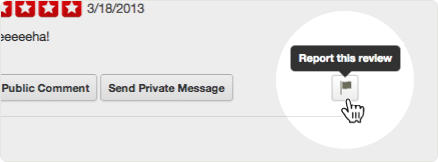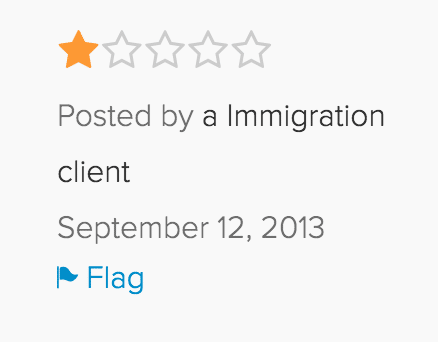Menu
February 19th, 2018
Updated: Feb 19, 2018
The question this week hits a nerve with about every attorney we speak to — because either they've received a negative review online or they're afraid it's just a matter of time before they do. Warren Buffett famously said, "It takes 20 years to build a reputation and five minutes to ruin it. If you think about that, you'll do things differently." The problem is that, today, even if you did everything right, or didn't even do anything at all, you can still get totally hosed by bad reviews.
There are a variety of scenarios that can generate a negative review and, unfortunately, review websites take no responsibility to vet the credibility of the reviewer until the review is flagged for a second look. Situations we've seen include:
- Competing lawyers trying to bring down the competition.
- People who leave a review for the wrong attorney.
- Family members who are upset on behalf of the client.
- Opposing parties who are angry at their own outcomes.
- Unscrupulous marketing companies trying to discredit their client's competitors.
- People who are mad that the lawyer would not represent them or didn't think their case had merit.
- Folks who get angry that their initial phone call wasn't returned.
- Clients who stopped paying / thought the billing was too much.
- A genuinely dissatisfied client who is mad because the lawyer actually screwed up.
Out of the listed scenarios, review websites are really only designed as a forum for the very last one — the genuinely upset customer. The sites all have policies stating that a reviewer must actually be a client of the law firm, but there is no technology or policing in place to enforce those policies before a review hits the web. It's only through a series of convoluted steps that a review can be taken down, and all the power is in the reviewer's hands.
Several months ago, we posted an answer about how to go on the offense and use review websites like AVVO, Yelp and others to your advantage. But here is a step by step guide on how to handle the situation should you get a bad review.
Step 1: Breathe, calm yourself
When you read something negative about yourself posted in public, you will have many of the physical and emotional symptoms you'd experience in a physical or verbal attack such as panic, anger, shortness of breath, rage, fear, anxiety, wanting to hide, etc. A quick response or angrily lashing out is not what you should do. When you cognitively dissect an argument that gets out of control, this is where it starts to go off the rails. Someone forgets to calm themselves and behave rationally early on.
Step 2: Dissect the situation.
Who posted it? Try to figure out exactly who posted the review. Is it a client, competitor, a fraud or unknown person?
Is the review legitimate? Be honest with yourself, does the review bring up legitimate concerns with the way you conducted business? It may be pretty obvious from the writing style and content of the review that the person isn't rational or that the review is way off base. But, it may also be a wakeup call that you've got real issues to address.
When was this review posted? If it has been up for a little bit and things have been fine, then that should be reassuring to you. If it was just posted then it probably hasn't been seen by many people, which is also good.
Where is it, how easy is it to find? Open an incognito or private window in your web browser and try to find the review. Do searches for your name and your firm, simulate what a potential client may do to find reviews or information about you online. Is it on page 1 or further back? Sites like AVVO, Lawyers.com, and Yelp are usually pretty visible.
Can you communicate rationally with the reviewer? This is pretty important to figure out. Do consider that, if a client has opted to publicly smear you online instead of resolving their grievance by talking to or emailing you, they're likely afraid of confrontation, not thinking very rationally, or both. If the review is fraudulent, then you're often not dealing with a rational actor.
Step 3: Take action, or don't.
There are usually four possible actions to take when dealing with a negative attorney review.
Privately Discuss With The Reviewer
If the review is legitimate, and the client is reachable and rational, then sometimes the best solution is a direct and private discussion. The business of delivering legal services can be fraught with tension and emotion. Sometimes, even the best outcome leaves the client unsatisfied. Yet, many times, people just want to be heard and their feelings validated. These can be awkward and difficult conversations but if it seems like the thing to do, suck it up and give them a call. Apologize if it is appropriate and negotiate for them to change or remove the review.
Do Nothing
This may be difficult to swallow, but sometimes it's best to do nothing. If the reviewer is really on edge, any response may just provoke more negative reviews on other websites under different names and email addresses. Further, if the content of the review appears kind of crazy or not truthful to a normal person, then maybe it's not having any negative impact. Further, if the review is hard to find, or if it has been posted for a while with no noticeable impact to your business, it may be best to just let it be. You can always revisit this decision down the road. You can also ask new or current clients if they saw the review when they were researching you online.
The danger in deciding to do nothing is that you'll never know who didn't call you because of the review, so you will have to weigh this against the risks of the other, more proactive options.
Flag the Review
There is a dispute resolution protocol that is pretty similar across the major online review websites. You can flag or tag a review as inappropriate or in violation of the site's terms of service. What follows is an automated process like this:
- The review will be temporarily taken down or hidden from the main view.
- The review website will send an automated email to the reviewer letting them know their review was flagged and asking them to consider rewriting it or reposting it, and giving them a 7-14 day period to respond.
- If the reviewer takes action by rewriting the review or reposting the original, then the review process is complete and the review stays published. If the reviewer lets the time period lapse, then the review will come down.
The risk in flagging the review is that it could be seen as a provocation by the reviewer, especially if it was a legitimate review. This could potentially cause them to make the review worse or lead to them posting more reviews on other websites. If, however, you think that the review is fake and that the person isn't likely to dispute the flagging, then this could be a safe way to put the whole thing to bed.
Publicly Respond
All major review platforms allow the business owner an opportunity to respond publicly to the review. This is often the preferred action because it gives you an opportunity to show off your character, creativity, commitment to service and legal mind. Believe it or not, a well crafted response to a negative lawyer review can actually turn into a marketing piece for you. A public response presents the opportunity to make readers think "Wow, they handled that really well, I want that lawyer handling my problems."
A response to a fraudulent review is pretty simple. You just call it out and prove it's fraudulent. Since review sites include names or initials, you can simply say that you have no client by that name or initials, or that you have no record of handling a matter like they describe. Just be totally sure it's a fraud.
A response to a person you actually represented or talked to requires much more care and consideration. Consider these key points in a response:
- Show care. Whether your fault or not, their life is in a rough spot if they've resorted to blasting you online. Show empathy for their situation, apologize if you think it's appropriate.
- Respect privacy. Unlike other businesses, lawyers are bound by a code of conduct and binding agreements about privacy, don't forget that here.
- Encourage them to seek counsel. If you think their legal issues are ongoing, encourage them to seek counsel and, if you can, show some of your expertise in explaining why.
- Make yourself available to talk. If you think it would be productive, offer to speak with them about their complaint.
- Explain how you've adapted. If you've identified a problem with the way you deliver service that is relevant to their complaint, explain how you have rectified that.
- Throw some shade. This can be risky, but if there is a way for you to diminish the reviewer's relationship to you, it is worth considering. If the person never became a client, see if you can work that in. If the person stopped paying their bill, explain how continued representation requires payment, etc.
Before posting your response it's important to have at least two people you trust read it and give you their feedback. You're the one being attacked, so you're naturally very close to the issue. People who are removed will be more dispassionate and probably offer points of view and advice you wouldn't think of on your own.
You can find excellent examples of real responses to negative reviews:
- Reviewing the wrong lawyer
- Why should I have to pay
- Fake client
- Initial Consultations Aren't Open Ended
And here are some lawyers who probably would have benefited from Step #1, breathe.
Step 4: Go On The Offensive... Bury The Bad With Good
With some concentrated effort, you can effectively push a bad review down the page by collecting new positive reviews that show ahead of it. By making a direct appeal to clients who are satisfied with your services, you can quickly reverse course and give yourself a bit of an ego boost as well. (Who doesn't like hearing nice things?) You should first target the website where the bad review is published. Then, you should proceed to target high visibility listings like your Google My Business listings, AVVO and Yelp. You can also do a Google search for your law firm name plus the word "reviews" to get a good hit list of places to target.
Pro tip #1: When asking clients for reviews, make it as easy as possible by emailing them a direct link to the page where they can review you.
Pro tip #2: Try to make it a routine practice to ask happy clients for reviews. This will not only yield more business, but will blunt the impact of future negative reviews.
We hope this gives you a roadmap and peace of mind should you be in the unfortunate situation of having to deal with a negative review. Be sure to check out our other post on using good reviews to your law firm's benefit. And finally, if you would like our consultation or assistance in handling negative reviews or in gathering positive reviews, just email support@themodernfirm.com and check out our law firm local marketing fundamentals service.
Categories: Question of the Week








